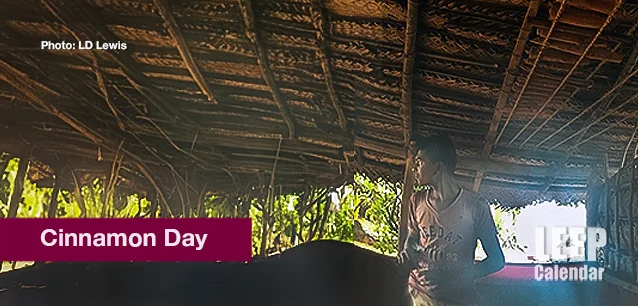 AD
AD
Today is: November 06
Scroll to explore events active on this date.
LEEP INK FEATURES

August is Appropos
A toddler playing in the fountain at a park in Santa Fe, New Mexico—Photo LD Lewis. In August, we live through the Dog Days of Summer. It's hot and often humid, and those ...

September is Sassy
Can you hear that sigh of relief from parents worldwide? Yes! September marks the return of students to school, a global phenomenon. Preparations for the ACT and SATs begin earnestly for ...

OOH LA LA, October
October is the busiest month for events, with 5% more happening than in May, the second most eventful month. Sailing enthusiasts will be glued to the finals of this year's Am...
About Cinnamon Day
Ends: Nov 01, 2025
DESCRIPTION:
Cinnamon Day, created in 2019 bby McCormick & Co, Inc., recognizes one of the world's favorite flavorings.
Cinnamon, a spice that has captivated palates and influenced trade routes for centuries, has a rich and storied history that dates back to ancient times. This aromatic spice is harvested from the inner bark of trees from the genus Cinnamomum, native to South Asian regions, particularly Sri Lanka and parts of India and China.
Ancient civilizations, including the Egyptians, Greeks, and Romans, greatly valued cinnamon for its medicinal properties, culinary uses, and as a preservative. Highly prized, cinnamon was often considered a gift fit for monarchs and gods. The Egyptians used cinnamon in their embalming process, while in ancient Rome, it symbolized wealth and status.
The exact origin of cinnamon was a closely guarded secret in antiquity, with early traders weaving elaborate tales to protect their monopoly and keep prices high. These tales often involved dangerous, fantastical creatures guarding the spice. The source remained a mystery to the Western world until the Portuguese found Cinnamomum verum, or "true cinnamon," in Sri Lanka in the 16th century.
Control over the cinnamon trade shifted hands several times, from the Portuguese to the Dutch and later to the British. These battles for dominance attest to the spice's value, and the lengths nations would go to control its supply.
Today, cinnamon is harvested by growing the tree for two years, coppicing it, or cutting it back to ground level. The following year, about a dozen shoots will form from the roots. Harvesters then process the shoots and carefully strip the bark, which naturally curls into quills as it dries. These quills are then cut into sticks or ground into powder for culinary use.
There are two primary types of cinnamon:
Ceylon cinnamon (Cinnamomum verum), known as "true cinnamon,"
and Cassia cinnamon (Cinnamomum cassia).
Ceylon cinnamon, milder in flavor, is grown in Sri Lanka, India, Madagascar, Brazil, and the Caribbean.
Cassia cinnamon, the type most commonly used in the United States and Europe, is more robust and slightly bitter and is primarily produced in China, Vietnam, and Indonesia.
Cinnamon's journey from ancient luxury to modern kitchen staples is a testament to its enduring appeal. Whether used in sweet or savory dishes, as a fragrance, or for its health properties, cinnamon is a beloved and versatile spice worldwide.
VIDEOS
SUPPORTING DOCUMENTS
Currently, this event does not have supporting documents.
ADDITIONAL IMAGES
Currently, this event does not have supporting images.
Where would you like to go now?
 AD
AD


/footer-logo.svg)
